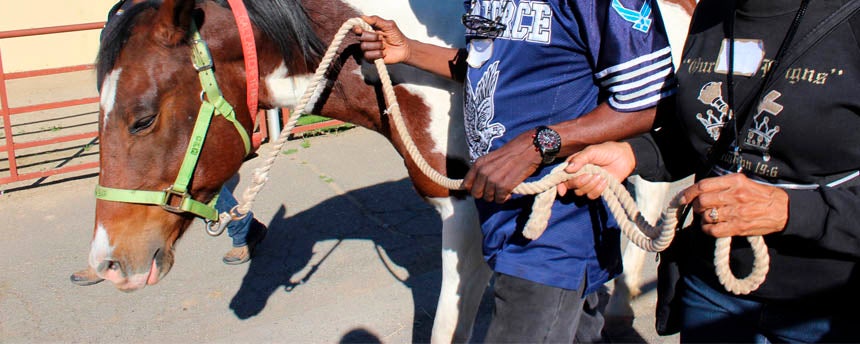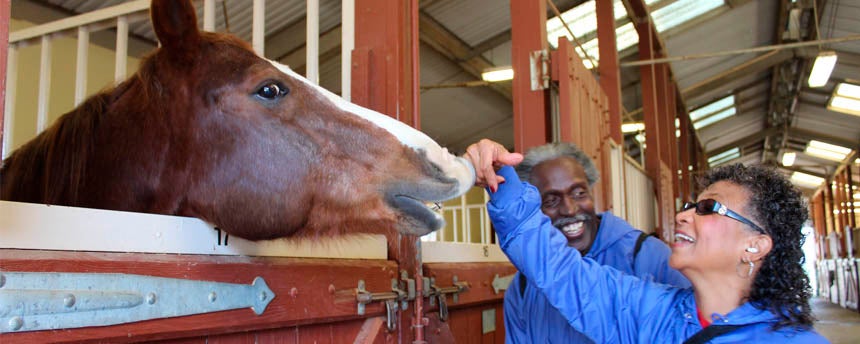After nearly 40 years of marriage, Charlotte Driver is confronting one of life’s biggest challenges — losing her connection to her husband, Richard, as he gradually loses his memory. Diagnosed with early onset dementia, it’s only a matter of time before he develops Alzheimer’s disease.
Determined to stave off the disease for as long as possible, the Drivers enrolled in a unique program aimed at harnessing the healing power of horses to improve the quality of life for people affected by dementia and their care partners. They visited the Center for Equine Health (CEH) at the UC Davis School of Veterinary Medicine last fall, along with six other couples, to participate in a research project that grew out of a collaboration with the UC Davis School of Medicine and The Connected Horse Project, a nonprofit organization dedicated to improving the lives of all those affected by dementia.
Over the course of three weeks, the Drivers joined the others in five-hour workshops designed to gradually introduce the couples to the horses. For Charlotte, it was an entirely novel experience; she had never touched a horse. But Richard was excited about being around horses again. As a teenager, he helped a neighbor care for his horses.
“They can really read your emotions,” Richard said. “Being around them brought back a lot of happy memories. I’m more conscious of my environment and my emotions while with horses.”
And that’s one of the main goals of the project — helping the patient and care giver get in touch with themselves and each other.
“This is a journey about relationships,” said Paula Hertel, a co-founder of Connected Horse. “It’s therapeutic for both of the partners.”

Initial study results are promising, Hertel said. Participants report decreased anxiety and depression, better sleep quality and a stronger sense of social support. She and co-founder Nancy Schier Anzelmo have presented their findings at several conferences to date, including the Alzheimer’s Association’s International Conference.
Not only are the equine experiences healing for people, they provide meaningful work for older horses too, said Claudia Sonder, director of outreach for CEH.
“This work is a great example of the one health initiative to solve problems for animals and humans, and gather significant science along the way,” Sonder said. “We plan to monitor the effect of the interaction on the horses as well as the humans, and I suspect it will be a win-win for both.”

The United States is home to more horses than any other nation, and we have a problem of many unwanted horses in this country, Sonder explains. Familiarity with the horse is at an all-time low, as the horse has transitioned away from its historical use as a war and transportation animal over the past 200 years. Many horses live into their 30s, and as they age, they become less suitable for recreational use; yet their experience and mental maturity make them much safer than young horses for interaction with people who know nothing about horses.
“The thought that we could harness the amazing social benefits of the horse-human interaction and give the geriatric horse a role in modern day society is truly exciting,” she says. “We have seen the benefits of horse-assisted therapy with autistic children, children with physical disabilities, post-traumatic stress syndrome victims, and in prisoner rehabilitation programs.”
She explained that horses have evolved over millions of years as prey animals to be highly in tune with their environment. They survive by reading their environment and their herd mates and reacting to cues. That makes them a great social mirror, as they will react to humans and reflect back the energy of the interaction, teaching humans confidence, self-awareness and self-control.
In addition to gaining a new appreciation for the sensitive nature of horses, Charlotte said they gained something more.
“When we left, we felt a sense of accomplishment and hope. We have hope no matter what happens — we’ll never give up,” she said. “I look at life a lot differently now and want to give this feeling to other people.”
Communications and marketing officer Trina Wood is the UC Davis School of Veterinary Medicine’s communications “Jill of All Trades.”